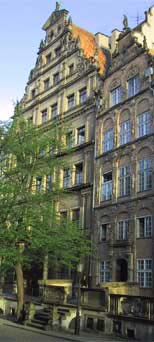Danzig -- History -- Relations to England and Scotland

ENGLAND. The presence of Scots and English was as strongly felt here as anywhere in German-speaking lands. In the 14th century the Teutonic Knights had supported trade with England and Scotland. Shortly after 1388 the English established a house in Danzig in which English merchants congregated, and Danzig became the seat of the English representative for Baltic trade. Even during the Thirty-Years War (1618-1648) approximately 56 English ships docked in Danzig every year. In 1665 the English established a Mercantile Collegium in Danzig. (Fiedler 123) Only after the commerce agreement of 1706 (approved 1708) and the union of England and Scotland was Queen Anne successful in pressing for the right of citizenship for English inhabitants in Danzig (this included the payment of taxes, but not other municipal obligations). The English reciprocated. It is not certain whether the large house, called the English House actually housed English merchants. In 1723 it had been an inn for some time, and at least one Englishman sold English goods there. (Papritz 179)
SCOTLAND. By the 16th century Danzig had become the most important of the Baltic ports for Scottish merchants. Beginning in the later 14th century Scots of all classes -- suffering from famines, religious and political oppression, and the consequences of primogeniture -- began a tradition of settling in and around Danzig, in particular in the village called (as early as 1433) Alt-Schottland. [map] From here Scottish pedlars (estimated to have numbered around 30,000 in the 16th century [Fischer, 37]) -- sometimes under the same legal restrictions as Jews -- traveled throughout Poland. Danzig merchants stationed "factors" or representatives in Edinburgh and Aberdeen, and the Scots maintained one in Danzig. They also contributed to the prosperity of the city. In 1680 merchant John Turner, who made his fortune in Danzig, left 400 Marks annually to fund scholarships for four poor students, legacies for the Scottish school, the Elisabeth Hospital and the smallpox hospital (Pockenhaus) in Danzig. (Fischer 60)
Many of the Scottish immigrants belonged to the reformed (Calvinist) faith, and by 1587 had received permission for their own ministry. Thus, at the end of the 16th century a Scottish-Evangelical Church existed in Danzig. (Fischer 187) Jacob Brown preached in English. In 1706 the English and Scotish communities purchased and renovated a house at Heiligengeistgasse 80, where they established a united "British Chapel". English and Scottish preachers were to alternate. The first preacher was Alexander Burnet from Aberdeen, Scotland (who had resided in Danzig since 1693), then 1712 Alexander Davidson, 1723 William Bickerton, 1727 Peter Hay.
[Hans Fiedler. "Danzig und England. Die Handelsbestrebungen der Engländer vom Ende des 14. bis zum Anfang des 17. Jahrhunderts" in Zeitschrift des Westpreußischen Geschichtsvereins. 68 (1928) 61-125.]
[Th. A. Fischer. The Scots in Germany: Being a Contribution towards the History of the Scot abroad. (1902) Edinburgh: John Donald Publishers Ltd., 1974.]
[Johann Papritz. Dietrich Lilie und das Englische Haus. In Zeitschrift des Westpreußischen Geschichtsvereins. 68 (1928) 127-188.
[Martha Dunsby. Die Englische Kirche in Danzig. Mitteilungen des Westpreußischen Geschichtsvereins 31/1 (1932) 1-12.]